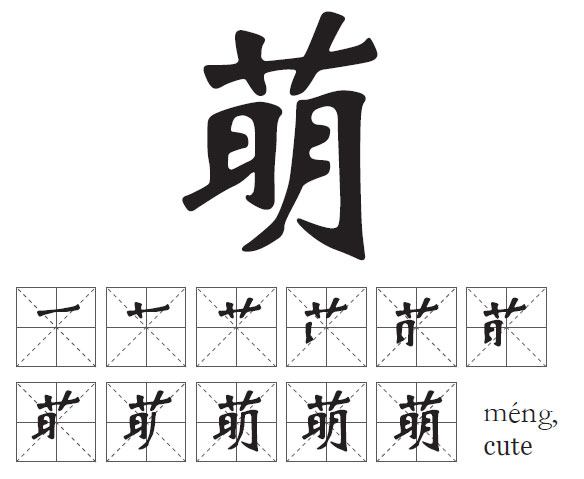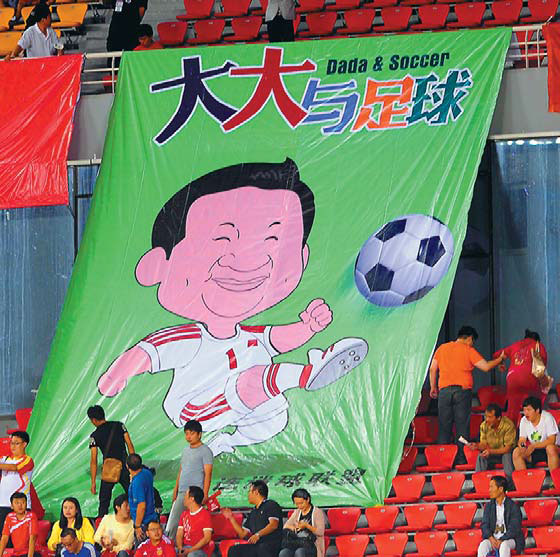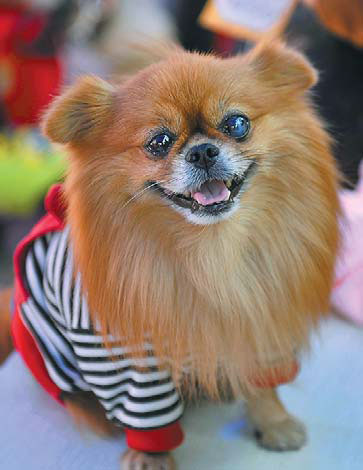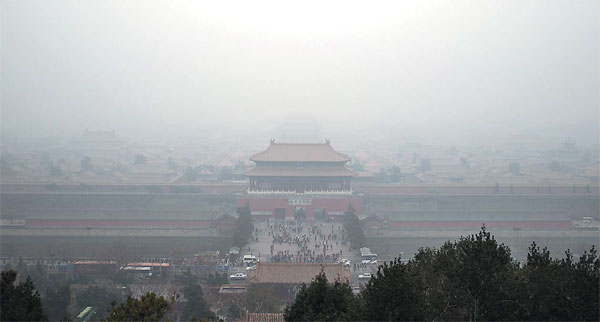The top characters of 2014

From 'warm man' to 'APEC Blue', these phrases best represent the current state of affairs and politics
As the book is closed on 2014, the season for looking forward to the new year begins. But, to look back for a moment, which characters were the most definitive of 2014 in China? Which character best describes a Chinese person's 2014? Every year, the Commercial Press co-hosts a roundup of the Chinese characters and words of the year that are representative of current events and state policies. Let's take a look at some of the top characters from last year.
| A cartoon of President Xi Jinping at a soccer match in Anshan, Liaoning province. Provided to China Daily |
1. Political: Law, frugality and rule
Among the top words, several characters and words are strongly political, putting an emphasis on the law and the anti-corruption campaign. 法 (fǎ, the law) has been pushed as a party directive in Communist Party of China meetings this year, and so has 依法治国 (yī fǎ zhì guó, ruling the country by law).
The anti-corruption campaign has led to several significant political figures' demise, as well as a frugality movement among officials nationwide. Naturally, both the character for frugality (廉, lián) and the word anti-corruption (反腐, fǎn fǔ) from the slogan "反腐倡廉" (Against corruption, promote frugality), made it to top 10 lists.
President Xi Jinping's nickname 习大大 (Xí Dàda, Papa Xi/Uncle Xi) is also a top 10 word, as well as his signature term "Chinese Dream" (中国梦).

| A cute dog at a canine fashion show in Nanning. Provided to China Daily |
2. Slang: Cute / moe and sunshine boy
This is the funniest of times, this is the cutest of times. 萌 (méng, cute) or 萌萌哒 (méngméngdā, cute) is now a popular buzzword from which has arisen multiple Internet memes and slang terms. The character 萌 initially refers to the sprouting of plants and trees in spring, but now its most commonly used definition is that of the Japanese "moe", which refers to a specific yet undefinable "cute" and "pubescent" trait found in cute girls. The meaning of the slang word has expanded from its original manga usage to Internet slang terms and everyday life. Leonardo DiCaprio for one has somehow become the face for the buzzphrase "感觉自己萌萌哒" (feel that I myself am cutesy).
While sometimes it is used in the same way to troll someone cute or sexy like Miley Cyrus or Taylor Swift, these words could also be used to express one's fondness for someone else or even oneself. So do you 觉得自己萌萌哒?
No one wants a 屌丝 diaosi, or a very ordinary man, but a "sunshine boy" - a new term that emerged last year - is highly sought after. 暖男 (nuǎnnán), literally "warm man", is a considerate, nice man with a smile that brightens up your life. A "warm man" tends to do household chores, cooks, understands others' feelings and emotions, cares for his wife, and loves his family. All in all, he is the combination of a Prince Charming and an ideal chick-flick charmer. Call yourself a 暖男 and you may be able to capture a few girls' hearts.
| The Forbidden City is covered by smog in November. Provided to China Daily |
3. Social: Rise, Internet and smog
Even though inflation became mild last year, and real estate stopped rising in many cities, the Chinese character for rise, 涨 (zhǎng) - which has remained a major character for almost four years of rapid increases -was still a concern in 2014.
The Internet (网, wǎng) made it into the top 10 characters as well, with online communities and social platforms thriving more than ever. Thanks to the Internet boom, e-commerce (电商 diàn shāng) had an amazing year as the Nov 11 shopping carnival broke new records, the Double Twelve shopping day followed with success, and Jack Ma took Alibaba to the New York Stock Exchange.
The character for smog, 霾 (mái), has also been a top 10 character more than once, clouding up the sky as well as people's physical and mental health. Truth be told, it is likely to stay. Thus, the APEC 蓝 (APEC Blue, the rare blue sky and clean air in Beijing during the APEC meetings) was extraordinarily incongruous. It became a word that describes something fleeting, too good to last.
The Chinese word for "come out of the closet", 出柜 (chū guì), has been in the Chinese language for a while, but it is the first time for the topic of homosexuality to be acknowledged as a top 10 word of the year. Perhaps thanks to the celebrities that have openly announced their sexuality, and the unstoppable frenzy of Bromance and slash fiction, the LGBTQ community can finally surface in the mainstream media.
Courtesy of The World of Chinese, www.theworldofchinese.com
(China Daily European Weekly 01/16/2015 page27)
Today's Top News
- Japan tempting fate if it interferes in the situation of Taiwan Strait
- Stable trade ties benefit China, US
- Experts advocate increasing scope of BRI to include soft power sectors
- New engine powers cargo drone expansion
- China to boost green industry cooperation
- Manufacturing PMI rises in November

































